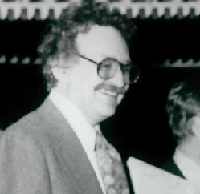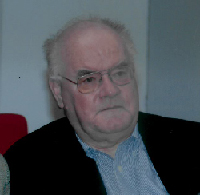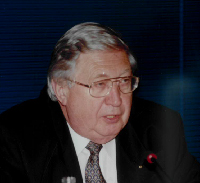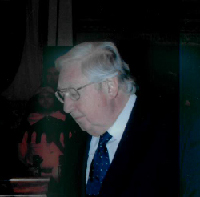OUR SCIENTIFIC COMMUNITY IS MOURNING THREE DEATHS
by Giampiero Nigro, Scientific Director
2019 was a year filled with gratitude and painful memories for the passing of three prominent scientists of the Datini Institute. Three great scholars, who have left us a lasting memory.

Immanuel Wallerstein (1930-2019) was a member of our Scientific Committee from 1979 to 2002, and subsequently a member of the Honours Committee. A famous American sociologist, historian and economist, he owes his fame to the pioneering studies on the world-system, which resulted in essential publications on the modern world economic system.

Last year Jean-Pierre Sosson (1935-2019), another member of the Scientific Committee of the Datini Istitute, also passed away. He joined the Scientific Committee in 2000 and remained on it until 2005. He specialised in the economic and social history of the Late Middle Ages and devoted himself mainly to finance and craftsmanship, with a particular focus on the cities of Flanders and Brabant.

Hans Pohl (1935-2019) was probably the most prominent German scholar of economic, social and corporate history. He began to visit Prato and its institute in 1969. His scientific excellence, coupled with an open-minded and empathic attitude, has left a deep mark on all of us. Hans Pohl had served on our Scientific Committee since 1986; he was the influential president from 2000 to 2006, the year he moved on to the Honours Committee, continuing to give his commitment until he had the strength to do so.
OBITUARY
Professor Dr. Dr. h.c. Hans Pohl

(born 27 March in Bärdorf near Münsterberg, Silesia; deceased 10 December 2019 in Cologne)
by Markus A. Denzel, Leipzig
Professor Dr. Dr. h.c. Hans Pohl was one of nationally and internationally most acclaimed scholars in the discipline of economic, social and business history of German-speaking Central Europe from the 1970s well into early 21st century. In research and teaching he was among those economic and social historians who a few decades ago in German academic tradition would be known as generalists, which today has become a rare trait that made him even more conspicuous. Since late 1950s Hans Pohl studied the history of international relations of trade and economy. When he began his studies, he focused particularly on the relations European countries had with Latin America; an obvious field of research for Richard Konetzke’s student, who was one of the most important scholars of Latin America of German tongue in the 20th century. He earned his doctorate from the University of Cologne in 1961 for his dissertation thesis titled “Die Beziehungen Hamburgs zu Spanien und dem spanischen Amerika in der Zeit von 1740–1806“. In his postdoctoral thesis (Habilitation) of 1968 also submitted to the University of Cologne, “Die Portugiesen in Antwerpen (1567–1648). Zur Geschichte einer Minderheit“ (published 1977), Pohl broke new research grounds in respect to space (the Netherlands, Western Germany) and time (16th to 17th century), to which he dedicated himself especially after he had assumed the chair of Verfassungs-, Sozial- und Wirtschaftsgeschichte at the University of Bonn in 1969. Despite having received three honorable appointments to the universities of Hamburg, Innsbruck and Vienna (1980/89) he stayed in Bonn until he retired in 2000. Over the course of his tenure he expanded his research aims: He supervised and chaired a priority program funded by the Deutsche Forschungsgesellschaft, “Deutsche Industriegeschichte bis 1914“, in which was analyzed by reference to examples provided by companies of different branches the integration of the Northern Rhineland within the Luxembourgian, Belgian and Dutch area during industrialization, as well as trade, commerce and capital in the 20th century. While he was studying business history and Rhine capitalism, he did not leave out aspects of the social history of groups and social classes, which he investigated and were present in his research: from merchants to entrepreneurs, to workers and salaried staff and also women, who then were far from standing in the limelight of the historians’ concern but whom Hans Pohl regarded self-evidently to be included in his studies. Moreover, he was among the first historians who (re-)introduced the research on elites, especially business elites; a field of interest many historians in Germany generally shunned well into the 1990s.
Hans Pohl engaged in politics of science in as much he was a member of a number of national and international expert societies of which he chaired many. In particular, he was member of the Comitato Scientifico of the Istitutio Internazionale di Storia Economica “Francesco Datini” in Prato. He was president from 1999 to 2006, and afterwards member of its Comitato d’Onore. Numerous lectures, profound and broad in scope, which he delivered in Prato and elsewhere stay with us; as are his brilliant ability to draw and synthesize connections in history of utmost complexity and the elegant aplomb with which he used to, in the best sense of the expression, preside over meetings. If not for the pursuit of a career as historian, he might have liked to enter diplomatic service – his considerable diplomatic talent has left its imprint on the developments of the expert societies for which and in which he worked for them. He leaves German and international economic, social and business history a rich legacy. Profound standard works, handbook-like articles and overviews, which he either wrote himself or edited, well-founded detailed research saturated with source analysis and many new approaches our discipline owes to this masterful, innovative and inspiring historian. In 2006 the Leipzig University awarded Hans Pohl an honorary doctorate for his academic merits. He, who in the past decades had had a large part in defining and transporting the image of German and Central European economic, social and business history at home grounds and abroad, and in his function as a member of national and international committees had encouraged communication and discourse in economic and social history between German and foreign scholars, now remains forever silent. Our devoted academic teacher, esteemed colleague and dear friend has passed away on 10 December 2019.